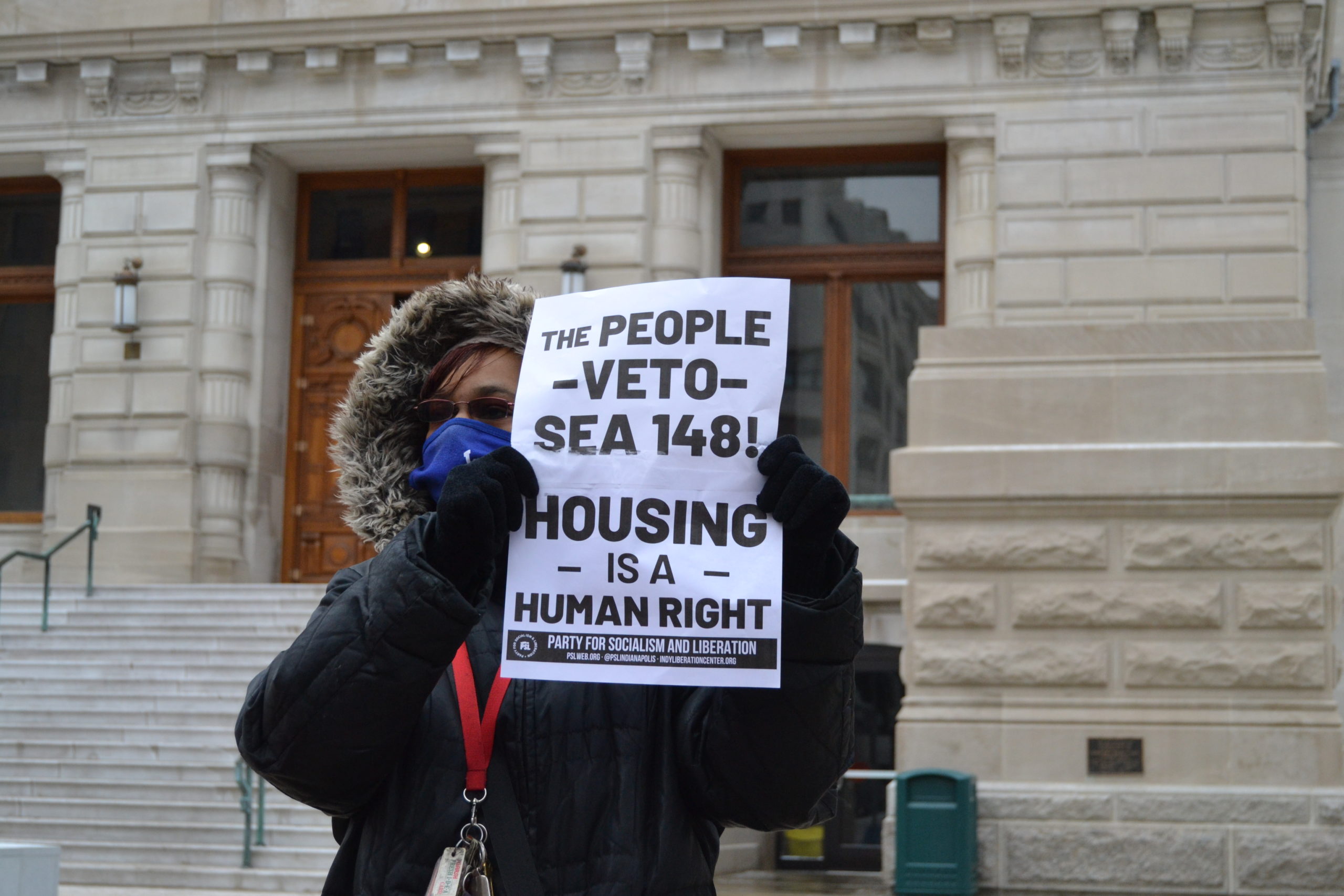by Eli Morey
Originally published on LiberationNews.org.
Dozens of activists convened on the steps of the Indiana State Capitol building at 9 am on Feb. 8, bearing freezing temperatures to protest the Indiana General Assembly’s attacks on the limited rights that tenants have in Indiana.
The protest, called for by Family Promise of Greater Indianapolis and supported by the Indianapolis branch of the Party for Socialism and Liberation and others, was primarily concerned with at a vote later in the day that would override Governor Eric Holcomb’s veto of Senate Enrolled Act 148.
SEA 148 is an insidious bill that seeks to remove the rights of cities and towns to pass local laws that impact landlord-tenant relations. Amy Nelson, executive director of the Fair Housing Center of Central Indiana, told Liberation News: “This is a bill that retaliates against Indianapolis, but will have statewide impact, in that it takes away all local control of the landlord-tenant relationship. This is in response to Indianapolis trying to educate tenants about their rights.”
The struggle against SEA 148 highlights significant problems around homelessness and housing insecurity that have faced Indiana, and in fact the entire the United States, for decades. In 2019, before being struck by the COVID-19 pandemic, Indianapolis alone was estimated to have a population of over 5,000 unhoused people. Nationwide, the number hovers around half a million.
Alex Slabosky, a board member for Family Promise, echoed these concerns: “We have always had a situation, even pre-pandemic, where we have demand for more families than we can possibly provide shelter for,” Slabosky said. “Since the pandemic began, this situation has only gotten worse. We are afraid that if this veto is overridden, we will see increased demand for shelter because even more people are going to be evicted.”
Slabosky went on to add, “In 2016, pre-pandemic, Indianapolis had more evictions than any other city in the country except for New York, which is about eight times the size of Indianapolis. The laws in the state of Indiana that regulate tenant-landlord contracts are heavily in favor of the landlord. We are looking for more balance in the laws that regulate these contracts.”
Hours later, the Senate voted to override the veto. The last step in making this proposed anti-tenant legislation law is a vote in the House, which only needs a simple majority. As of this writing, the House hasn’t scheduled the vote. The four House Republicans that advanced the legislation last year either own rental properties, work for real estate law firms or title companies or are married to law firms that represent apartment complexes according to an IndyStar investigation.
State Senate overrides veto and the struggle continues
Since May of last year, the PSL has held several protests, speak outs and other events in the struggle for housing rights. At the protest Feb. 8, the Party’s contingent held placards not only opposing the attempt to override the veto but calling for the immediate cancellation of all rents and mortgages, stopping all evictions and foreclosures, and housing the homeless.
Mari Luna, a member of the Indiana Undocumented Youth Alliance, agrees that the struggle is deeper than this one bill. Luna told Liberation News at the demonstration: “It is important that we acknowledge the systematic issues in the state of Indiana preventing all residents from obtaining safe housing. A lot of the individuals [facing homelessness] are either incoming immigrants or BIPOC who were not given a chance and are now out in the street without any type of protection.”
Disturbingly, the imbalance of power between landlords and tenants is even greater for people of color and undocumented immigrants, who face serious challenges to housing and employment. Systemic racism in housing is starkly apparent in Indianapolis, a city in which African Americans make up 27 percent of the total population, but as of January 2020, account for 54 percent of those sleeping “in emergency shelter, transitional housing, and safe havens on a single night.” This figure doesn’t include those sleeping on the streets or in makeshift encampments.
Whether or not the House affirms the veto override of SEA 148, the people must continue to struggle. The protest at the Capitol was part of a nationwide movement to protect the rights of tenants amid the increased financial instability caused by the government’s handling to COVID-19 and the economic crisis. Across the country, working class people are now taking the fight for housing justice into their own hands and reclaiming their right to live without fear of eviction.

